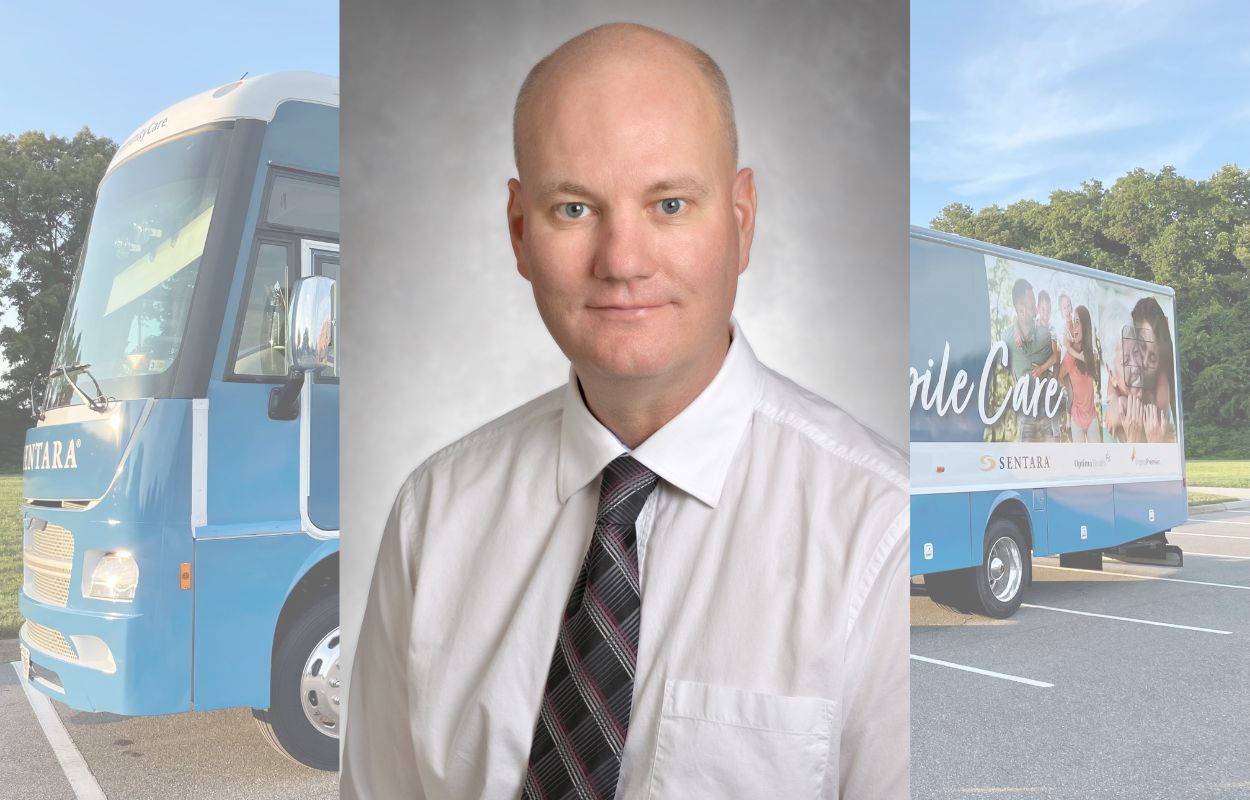Putting health care where it needs to be
A new alumnus-led program in eastern Virginia targets health disparities in medical deserts

Photo courtesy of Sentara Healthcare
This story was published in the spring 2023 issue of 12th & Marshall. You can find the current and past issues online.
The community health program that Michael Charles, M’85, oversees in Hampton Roads, Virginia, has been operating for less than a year, but it’s already seeing quantifiable results.
One element of the program is a new clinic in a local homeless shelter that has reduced emergency room visits by its residents from over 10 a month to about two. One man who had been to the ER 157 times since moving in is now getting regular checkups and managed care at the on-site facility.
For Charles, the program represents the culmination of a career spent trying to close gaps in primary care and provide wraparound services where they’re most needed. His vision for what’s become the Sentara Community Care Program was borne out of the pandemic and the stark disparities that became apparent. Charles saw discrepancies in vaccination rates and COVID-19 outcomes. Those correlated with higher use of the ER.
“When we started looking at heat maps around the area, they all kind of overlapped,” Charles says.
Diabetes control, cancer rates, food deserts, Section 8 housing – they all corresponded with a lack of health care, especially primary care, in the area.
“We just realized that if we are going to help this population and decrease some of these health disparities, we're going to have to put medical practices where they need to be,” Charles says.
Two clinics now offer services in Norfolk: one inside the Union Mission homeless residential facility and a second in the medically underserved Berkley community, a first-floor clinic right inside the housing complex. Nurse practitioners are on hand every day. Doctors rotate through, including a pediatrician. There’s a social worker and a psychiatrist. And the program partners with a nearby food bank and substance use counseling center.
“Social determinants of health like housing, financial literacy, food insecurity and transportation needs directly impact 80% of our health and well-being,” Charles says. “This program is a holistic, person-centered approach that we hope will build more equitable communities.”
Bringing the community together
A third branch of the program brings health care to people’s doorsteps via a mobile bus, for both walk-ups and appointments. It’s outfitted with a blood-drawing station, a lab and a full exam room. Charles works with faith-based leaders and attends civic league meetings to get the word out about the van’s future locations.
Beyond the quantifiable results, many patients remind Charles why the program is so important, like a 60-year-old woman with diabetes who walked into the Berkley clinic wanting her sugar checked. She was out of insulin, as she couldn’t afford the copay.
In addition to checking her sugar levels and her overall health, providers were able to get her the money for the copay in the short term, send her home with diabetic-friendly food from the food bank and navigate her insurance eligibility to remove any future copays.
“She was crying because she just wasn't expecting help like that,” Charles says.
Another patient was a mother of three, pregnant with her fourth child, and newly arrived from Mexico. Not only could the clinic refer her to an obstetrician and schedule well-child visits, but clinic staff connected the family with a Hispanic church nearby, which helped furnish and stock their new apartment.
“The husband had gotten a job and they had just moved in, but they had no food or clothing or furniture,” Charles says. “That evening, the congregation brought them what they needed, and people in their apartment complex gave more the next day. The community came together, and it started at our clinic.”
Charles practiced family medicine in Virginia Beach for 30 years with Sentara Healthcare. Serving as medical director of the new program provides him the opportunity to build a unique resource from the ground up.
“Until we hired all the nurse practitioners, it was me seeing patients at the Union Mission, seeing patients at Berkley, seeing patients in the van,” Charles says. “And, of course, I still help out.”
A coming expansion will increase the staffers that Charles helps oversee. Meanwhile, a new van will soon cover the Richmond and Petersburg areas. The plan is to expand across Sentara’s entire footprint in Virginia and North Carolina over the next two years.